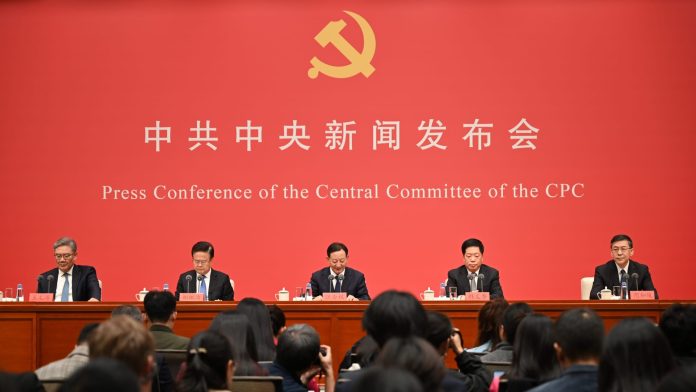Senior Chinese officials speak at a press conference of the Central Committee of the Chinese People’s Congress after the Chinese Communist Party concluded its Fourth Plenum.
Picture Alliance | Picture Alliance | Getty Images
BEIJING — China’s top leaders on Thursday pledged to boost domestic consumption over the next five years, alongside widely expected plans to strengthen self-reliance in advanced technologies such as quantum computing and hydrogen power.
That’s according to a state media readout of the closely watched “Fourth Plenum” meeting for setting five-year development targets. China on Thursday also confirmed that Vice Premier He Lifeng, who participated in the plenary meeting, will visit Malaysia from Friday to Monday for U.S. trade talks — as anticipation grows over a possible meeting between the U.S. and Chinese presidents at the end of the month.
Despite broad calls to bolster China’s international influence and “safeguard the multilateral trading system,” the readout did not mention major countries by name as the meeting focuses largely on domestic development.
China must “vigorously boost consumption,” the meeting readout said, according to a CNBC translation of the Chinese. The leaders elaborated on the need for consumption with calls to balance it with “effective investment” and “adhere to the strategic point of expanding domestic demand.”
“New demand will lead to new supply, and new supply will create new demand,” the report said. The leaders also called for effective implementation of policies to support businesses and “special actions” to boost consumption.
The tone indicates that China’s policymakers are taking a closer look at the relationship between economic supply and demand than they have in past years, said Zong Liang, former chief researcher at the Bank of China.
That change — which doesn’t come lightly in China’s ideologically driven government — still isn’t a green light for cash handouts. Even with muted retail sales since the pandemic, Beijing has steered away from directly giving consumers money, in contrast with U.S. stimulus checks in the wake of Covid-19.

The readout “signals a continued emphasis on investment — this time as a means to stimulate consumption — rather than a bold, direct push to expand consumption itself,” Yue Su, Beijing-based principal economist for China at the Economist Intelligence Unit, said in a note.
“We can therefore expect investment to focus more on consumption-related sectors and activities, such as improved urban planning, public services, and elderly care,” she said. Su pointed out that over the past decade, China has relied heavily on investment to drive growth, raising concerns about overinvestment.
China has sought to boost consumption in the last two years with subsidies targeted at home appliances and certain other consumer goods. The country has also encouraged local governments to hold sporting events and other entertainment to boost spending.
Since the readout didn’t call for “vigorously boosting income,” Eurasia Group’s China Director Dan Wang is more cautious about Beijing’s consumption plans.
“It is just a wishful goal,” she said. “I can’t see fiscal commitment in this.”
The readout reaffirmed the 2025 growth target of around 5% and other previously shared goals for 2027 and 2035.
All that implies annual growth of 4.6% through 2035, Wang said, noting it will be “very costly” to achieve. She expects Beijing to ultimately concentrate resources in high-tech and emerging industries, with little improvement on the demand side, while deflationary pressures persist.
China’s previous policy goals to become a global leader in electric cars, for example, have been criticized for encouraging companies to flock into subsidy-supported industries, resulting in a race to the bottom that’s then pressured industries in other countries.
A ‘significant leap forward’ in tech
Beijing has moved this year to curb excessive competition. But the country also accelerated its technological development in response to U.S. restrictions on China’s access to advanced technology.
China’s top leaders on Thursday called for improving tech self-reliance. “We will strive for the next five years to achieve a significant leap forward in [China’s] economic strength, scientific and technological strength, national defense strength, comprehensive national power and international influence by 2035,” the readout said.

Weekly analysis and insights from Asia’s largest economy in your inbox
Subscribe now
It also called for developing a “strong agricultural nation” and “accelerating the establishment of a strong manufacturing nation,” while noting the need to maintain a “reasonable” proportion of manufacturing in the country.
That language on manufacturing “suggests that the emphasis on industry will broadly remain,” said Louis Kuijs, APAC chief economist at S&P Global Ratings. The readout overall “points to a continued push towards self-reliance in science and technology and a strong China in a world seen as increasingly challenging.”
“It remains to be seen how much emphasis will be placed on expanding the role of consumption over the next five years, relative to other goals,” Kuijs said.
The meeting readout’s only mention of the ongoing property slump called for “high-quality development” of real estate. Beijing also noted it will work towards previously released plans to reduce carbon emissions.
GNI and GDP
During a press conference Friday morning on the Fourth Plenum, China’s Commerce Minister Wang Wentao said that the U.S. and China could still find ways to cooperate and address their differences.
Wang said that Beijing would track gross national income — the total of all earnings by all residents at home and abroad — and gross domestic product. He did not elaborate.
Zheng Shanjie, director of the economic planning agency National Development and Reform Commission, said the residential consumption rate would “clearly rise” over the next five years.
“Whether an explicit official target for the share of consumption in GDP will be set remains to be seen; if so, it will be a positive surprise for the market,” Ning Zhang, senior China economist, UBS Investment Bank, said in a note Friday.
A more comprehensive readout is expected in the coming days. China typically doesn’t release detailed full five-year targets until its parliamentary session in March.


